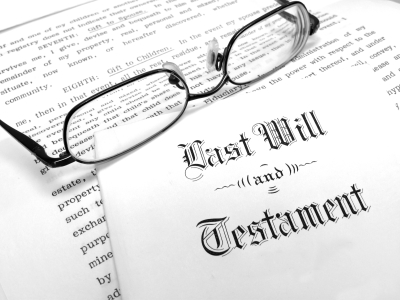
Last Will & Testament
Of all the basic estate planning documents, this is the one
that people are most familiar with. The basic requirements of a will are that the maker of the will, known as the “testator,” be at least 18 years old and of sound mind. “Sound mind” means that the testator must have an understanding of what his property is and who he wishes to give it to at his death. Some people wrongly believe that if a person has a degenerative mental health disease such as Alzheimer’s or dementia, that they cannot make a will. But the presence of these ailments doesn’t mean the person can’t make a will, they just need to be of sound mind at the time the will is signed.
Why do you need a will? That depends. If you and your spouse want to give all your property to each other, you have no debts, and no minor children, you may not need a will – Ohio law allows for the surviving spouse to inherit your entire estate. But wills are meant to account for, not only your known estate and current family and financial situations, but also issues that may arise in the future. Therefore, most people need a will to ensure their estate is distributed as they wish – whether to family, a church, charity, or whatever one’s wishes may be.
Durable Financial Power of Attorney
 This important document, also known as a “POA”, is necessary while you are living, but it expires at your death. The POA allows a person you trust, known as your “agent” or “attorney-in-fact,” to act for you in financial matters in case you cannot for some reason. Your agent can be your spouse, child, parent, sibling, etc. For example, if you are suffering from an illness that prevents you from managing your finances, you will need someone to help you pay your bills and manage your accounts. Most, if not all, companies you deal with will require some documentation that that person has authority to perform those transactions. That’s a good thing! Otherwise, theft and fraud of all types would be far more rampant than they are.
This important document, also known as a “POA”, is necessary while you are living, but it expires at your death. The POA allows a person you trust, known as your “agent” or “attorney-in-fact,” to act for you in financial matters in case you cannot for some reason. Your agent can be your spouse, child, parent, sibling, etc. For example, if you are suffering from an illness that prevents you from managing your finances, you will need someone to help you pay your bills and manage your accounts. Most, if not all, companies you deal with will require some documentation that that person has authority to perform those transactions. That’s a good thing! Otherwise, theft and fraud of all types would be far more rampant than they are.
Even if all your accounts are held jointly with another, say your spouse, you may still need a POA, as many transactions will require the signatures of both spouses. If one spouse cannot sign for him or herself, the other will need to demonstrate authority to sign for that spouse. This is especially true when buying and selling real estate and opening and closing bank and investment accounts.
Health Care Power of Attorney
As with a financial POA, you are appointing an agent to assist you when you cannot act for yourself. The difference is in the name. A health care power of attorney appoints someone to make health care decisions for you in case you cannot. If you do not have a health care power of attorney in place, your wishes for care, comfort, and treatment during a medical emergency may not be carried out.
The Ohio State Bar Association offers a uniform health care power of attorney for any individual to complete at no charge without the help of an attorney. However, if you have questions, concerns, or feel that the basic form is not adequate for your needs, it is best to consult with an estate planning lawyer.
Living Will
This is the final document typically included in an estate planning package. The living will gives your instructions to medical professionals, in the event that you are permanently unconscious or incapacitated. It is important to remember that the living will trumps your health care power of attorney, so you want to make sure it accurately reflects your wishes. Once again, the living will is provided by the Ohio State Bar Association at no charge to individuals, but you may wish to seek advice from your estate planning lawyer, if you have any questions or concerns.
What to do next?
If you do not have an estate plan in place, or if you feel you need to review it to make sure it is structured the best way possible to carry out your wishes, contact an experienced estate planning attorney as soon as possible. Utrecht Law Office focuses on estate planning, and we are well-equipped to provide you with everything you need. Whether you need to start from scratch or review a plan already in place, we will do our best to ensure your estate plan works for you!


Site
Before you meet with an estate planning specialist to create your plan, make sure you do your homework and organize your thoughts and plans so that you can make the most of the time when you meet with an expert. Estate planning is complicated, and we encourage everyone to seek help from an attorney and tax adviser.